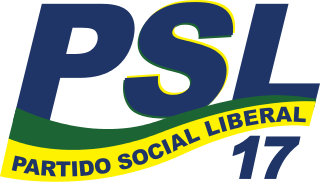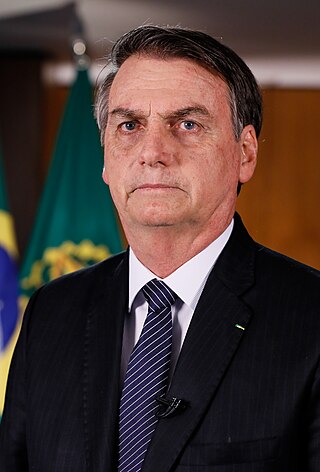
The Ministry of Foreign Affairs is responsible for managing the foreign relations of Brazil. Brazil is a significant political and economic power in Latin America and a key player on the world stage. Brazil's foreign policy reflects its role as a regional power and a potential world power and is designed to help protect the country's national interests, national security, ideological goals, and economic prosperity.

Fascism is a far-right, authoritarian, ultranationalist political ideology and movement, characterized by a dictatorial leader, centralized autocracy, militarism, forcible suppression of opposition, belief in a natural social hierarchy, subordination of individual interests for the perceived good of the nation or race, and strong regimentation of society and the economy.
Neo-fascism is a post–World War II far-right ideology that includes significant elements of fascism. Neo-fascism usually includes ultranationalism, racial supremacy, populism, authoritarianism, nativism, xenophobia, and anti-immigration sentiment, as well as opposition to liberal democracy, social democracy, parliamentarianism, liberalism, Marxism, capitalism, communism, and socialism. As with classical fascism, it proposes a Third Position as an alternative to market capitalism.

Brazilian Integralism was a political movement in Brazil, created in October 1932. Founded and led by Plínio Salgado, a literary figure somewhat famous for his participation in the 1922 Modern Art Week, the movement had adopted some characteristics of European mass movements of those times, specifically of Italian fascism, but distanced itself from Nazism because Salgado himself did not support racism. He believed that every person of every race should unite under the Integralist flag. Despite the movement's slogan "Union of all races and all peoples", members and leaders like Gustavo Barroso held anti-Semitic views. The name of the party created to support its doctrine was Brazilian Integralist Action. The reference to Integralism mirrored a traditionalist movement in Portugal, the Lusitanian Integralism. For its symbol, the AIB used a flag with a white disk on a royal blue background, with an uppercase sigma (Σ) in its center.

Far-right politics, or right-wing extremism, is a spectrum of political thought that tends to be radically conservative, ultra-nationalist, and authoritarian, often also including nativist tendencies. The name derives from the left–right political spectrum, with the "far right" considered further from center than the standard political right.

The Vargas Era is the period in the history of Brazil between 1930 and 1946 when the country was governed by president Getúlio Vargas. The period from 1930 to 1937 is known as the Second Brazilian Republic, and the other part of Vargas Era, from 1937 until 1946 is known as the Third Brazilian Republic.

The Estado Novo was the corporatist Portuguese state installed in 1933. It evolved from the Ditadura Nacional formed after the coup d'état of 28 May 1926 against the unstable First Republic. Together, the Ditadura Nacional and the Estado Novo are recognised by historians as the Second Portuguese Republic. The Estado Novo, greatly inspired by conservative and autocratic ideologies, was developed by António de Oliveira Salazar, who was President of the Council of Ministers from 1932 until illness forced him out of office in 1968.

The Vlaamsch Nationaal Verbond, widely known by its acronym VNV, was a Flemish nationalist political party active in Belgium between 1933 and 1945. It became the leading force of political collaboration in Flanders during the German occupation of Belgium in World War II. Authoritarian by inclination, the party advocated the creation of a "Greater Netherlands" (Dietsland) combining Flanders and the Netherlands.

The National Union was the sole legal party of the Estado Novo regime in Portugal, founded in July 1930 and dominated by António de Oliveira Salazar during most of its existence.

The Social Liberal Party was a far-right political party in Brazil, that merged with the Democrats and founded the Brazil Union. Founded in 1994 as a social-liberal political party, the PSL was registered on the Superior Electoral Court in 1998.

The Liberal Party is a conservative political party in Brazil. From its foundation in 2006 until 2019, it was called the Party of the Republic.
Hutu Power is a racial and ethnosupremacist ideology that asserts the ethnic superiority of Hutu, often in the context of being superior to Tutsi and Twa, and that therefore they are entitled to dominate and murder these two groups and other minorities. Espoused by Hutu extremists, widespread support for the ideology led to the 1994 Rwandan genocide against Tutsi and their family members, the moderate Hutu who opposed the killings, and Twa who were deemed traitors. Hutu Power political parties and movements included the Akazu, the Coalition for the Defence of the Republic and its Impuzamugambi paramilitary militia, and the governing National Republican Movement for Democracy and Development and its Interahamwe paramilitary militia. The theory of Hutu people being superior is most common in Rwanda and Burundi, where they make up the majority of the population. Due to its sheer destructiveness, the ideology has been compared to historical Nazism in the Western world.

Fascist movements in Europe were the set of various fascist ideologies which were practiced by governments and political organizations in Europe during the 20th century. Fascism was born in Italy following World War I, and other fascist movements, influenced by Italian Fascism, subsequently emerged across Europe. Among the political doctrines which are identified as ideological origins of fascism in Europe are the combining of a traditional national unity and revolutionary anti-democratic rhetoric which was espoused by the integral nationalist Charles Maurras and the revolutionary syndicalist Georges Sorel.
Indigenism can refer to several different ideologies that seek to promote the interests of indigenous peoples. The term is used differently by various scholars and activists, and can be used purely descriptively or carry political connotations. There are a range of ways to define Indigenous identity, including political, legal, cultural, and geographic distinctions.
Fascism in South America encompasses an assortment of political parties and movements modeled on fascism. Although the ideology originated in and is primarily associated with Europe, fascism crossed the Atlantic Ocean in the interwar period and had an influence on South American politics. Italian fascism had a deep impact in the region, both directly and indirectly.

Jair Messias Bolsonaro is a Brazilian politician and retired military officer who served as the 38th president of Brazil from 2019 to 2022. He previously served in the Brazil Chamber of Deputies from 1991 to 2018.

Eduardo Nantes Bolsonaro is a Brazilian politician, lawyer and federal police officer. He is the third child of Jair Bolsonaro, the 38th president of Brazil.

Romeu Zema Neto is a Brazilian businessman, administrator, and politician affiliated with the NOVO party. The current Governor of the state of Minas Gerais, Zema served as the head of the Zema Group, an industrial conglomerate, from 1990 to 2016. First elected in 2018, he won 42.73% of the valid votes, qualifying for a second round against Antônio Anastasia. Winning with 72.80% of the votes, he was inaugurated in 2019.














